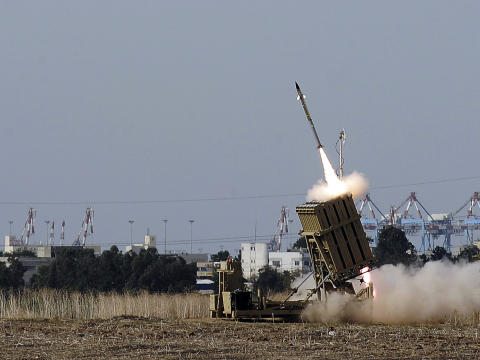Defense Secretary Leon E. Panetta and Israeli Defense Minister Ehud Barak praised the performance of the Iron Dome air defense system during a press conference here today.
Panetta said the Iron Dome system, which was developed by the Israelis and funded in large part by the United States, prevented war following hundreds of recent Palestinian rocket attacks on Israel from the Gaza Strip. The two men spoke to reporters after meeting at the Pentagon.
“I’m very proud that our two countries cooperated so closely to field the Iron Dome anti-rocket system,” Panetta said, noting the system performed remarkably well during the rocket onslaught. “It intercepted more than 400 rockets bound for Israeli population centers, for a roughly 85 percent success rate overall,” he said.
“Its success is a testament to the ingenuity of the Israeli people and to the commitment of the United States to Israel’s security,” he said. “Today, I assured the minister that our strong commitment to Iron Dome will continue into the future.”
The U.S. provided $70 million in fiscal year 2012 funds for the system, on top of the $205 million previously allocated, Panetta said, noting DOD will continue to support the system in the future.
“We will obviously continue to work together to seek additional funding to enable Israel to boost Iron Dome’s capacity further and to help prevent the kind of escalation and violence that we’ve seen,” Panetta said.
Iron Dome prevents wars, Panetta said, but Israeli and Palestinian leaders must sit down and resolve their differences for real peace in the region.
Barak thanked the United States for the funding to deploy the Iron Dome batteries.
“We highly appreciate your plans to help us in the future on the same issue, because the needs are much larger than what we have right now, and we are determined to complete the system, besides the operational offensive capacities of the Israeli armed forces,” Barak said.
Panetta and Barak also spoke about relations between the two nations, and touted the strength of the U.S.-Israeli partnership. Panetta said it is the strongest he has ever seen, describing it as based on shared values and also “on the iron-clad commitment of the United States to Israel’s security.”
Panetta said the United States strongly supports Israel’s right to defend itself and strongly condemned the rocket attacks launched by Hamas against Israel.
“We are encouraged that the cease-fire agreement has held,” he said.
The secretary stressed that the United States will continue to work with Israel and Egypt to end the smuggling of arms into Gaza. “No nation should have to live in fear of these kinds of attacks,” he said.
Panetta and Barak also spoke about the Iranian nuclear danger. Both nations have continuing concerns over Iran’s destabilizing activities and its nuclear program. Panetta reiterated that the United States will prevent Iran from obtaining a nuclear weapon.
“Iran is facing unprecedented pressure from the … crippling sanctions that have been imposed by the international community,” he said. “And I continue to believe that there is time and space for an effort to try to achieve a diplomatic solution, which remains, I believe, the preferred outcome for both the United States and for Israel.”
Barak said the United States and Israel share the same beliefs in freedom, liberty, democracy and human dignity. The United States, he said, is a “moral beacon” to the people of the turbulent region. “We are highly appreciative of this role,” he said. “We always keep the right to defend ourselves by ourselves on time where it’s needed, but I think that the role of the United States is invaluable in our region.”
Before leaving Israel, Barak announced he will retire from political life. Panetta paid tribute to his Israeli counterpart, praising “his brilliant strategic mind,” which “stems from his warrior heart and his warrior experience.”
The secretary pinned the DOD Medal for Distinguished Public Service on Barak.










